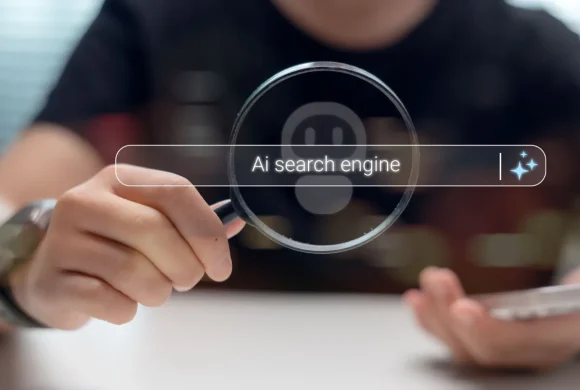Optimising Websites for AI Search – Future Proofing your Digital Footprint

Search is changing fast - how we optimise websites to stay visible
Do you always use Google for search?
Or have you started to do your web searches using a language model (LLM) AI chatbot like Chat GPT, Google Gemini, Microsoft Copilot, Claude or Perplexity AI?
If you’re anything like me, you do a mixture of Google and AI searches depending on whether you’re looking for a product or service, researching a topic or doing deep thinking around a subject.
As I’ve said consistently over the past year – search is fracturing, and before too long, we’ll all be creating our own mix of search ‘engines’ and enjoying our own unique search experience.
So, as search options explode, what’s the implication for your business and the future visibility of your website?
A couple of key points.
Firstly, all the search engines, whether traditional or AI language bot are all looking for the same thing.
Consistent, reliable, high-quality content.
If you create a hub of high-quality, authoritative and original content on your website around a particular niche and add to it regularly, you will be rewarded with visibility on the engines now and into the future.
Secondly, it’s unrealistic to chase one engine or another. You’ll simply run around like a chook trying to care for several broods of chicks. Stressed out and failing.
Instead, to secure our digital footprints today and tomorrow, we need to take a broad brush approach and optimise for both traditional and AI-driven search engines to ensure maximum exposure across them all.
In this article, I focus on optimising your website for AI search while maintaining traditional search traction.
Hope you enjoy the read.
“Search engines are not just reading your content — they are watching how users react to it.”
Optimising your website for AI search
Here are the five key areas we are focusing on to optimise our client’s websites for AI search.
- High-quality, authoritative content
- Natural language – a conversation
- Superb brand position, design and user experience
- Optimise for zero-click searches and featured snippets
- Technical SEO – website structure, optimisation domain authority
The list is based on research, data analysis and experience.
The first three focus on the user, and the last 2 are more technical. As always, the user-focused activities 1,2 and 3 are the most challenging and the most important.
Let’s explore each of these
1 Consistent, high-quality, authoritative content
This is not new in itself – Google has always wanted and ranked quality content that is trustworthy, reliable and backed by expertise.
The difference with the AI-engines is that they favour more depth. They really value a long, deep dive into any given subject with comprehensive coverage of the topic.
Long doesn’t mean boring. It also doesn’t mean waffle or filler content.
The content still has to be high-quality. It should be clear and well-structured, using bullets, headings and summaries.
Structure and clarity allow a reader to skim to sections they want to read. It also allows the search engines to pick out snippets for summaries to answer text and voice searches.
AI search also favours current information. Being diligent and regularly adding new, up-to-date content to your website builds trust with all the engines and, ultimately, trust in your business.
And talking of trust… yes, AI does look at trust signals just like Google.
If you’re a new kid on the block, your website won’t feature in AI-search results as well and consistently as an older, more trusted site.
2 Natural language – a conversation
AI is not just looking for keywords – it actually understands context.
So, the more your content talks in a natural, conversational way, the more AI will understand your niche and where your business fits in the digital landscape.
Dropping in examples, people, places, brands, and stories helps AI bots to create a complete picture.
The more your content feels like a conversation with a client, the better.
AI also trusts a brand that maintains a consistent voice.
This is, of course, great news because a consistent voice is also what your customer base is looking for.
“AI doesn’t just read your content — it understands what you mean.”
3 Superb brand position, design and user experience
AI search engines monitor human behaviour on your website.
They monitor how long people stay, how completely they read the content and whether they go back and look again.
You get bonus points if they start searching for your brand by name.
The simple fact is that if humans don’t like your website, bots won’t feature your website in search results.
So, as always, if you want to create a large digital footprint and rank in search results,
- your brand and positioning must be exactly what your market are looking for,
- your website design must be compelling and appeal to your customers and
- navigating your website to find what I’m looking for should be child’s play.
“If your content helps people, AI will help people find it.”
4 Optimise for featured snippets and zero-click searches
AI pulls content from snippets and highlighted sections of text to answer questions people ask it.
The key to appearing in the zero-click and highlighted search results is to answer the questions your market is asking in well-structured, short paragraphs of text.
Bullets, lists and FAQ sections also help.
5 Technical SEO – website structure, optimisation and domain authority
Technical SEO is still vital.
The initial structuring of your website around a niche is the vitally important first step.
Once you have this part right, on-page optimisation and domain authority remain key.
Then, as always, data analytics and strategic content planning based on results, opportunities and business cases drive technical SEO in the right direction.
Maintaining traditional search traction
This is good news.
Everything I’ve mentioned above to optimise your business website for AI-generated results will also improve your ranking on traditional searches.
Google has always ranked high-quality content on optimised websites, and AI simply wants a more evolved version of this.
Yes, there’s more to do, but there’s also more opportunity.
At the time of writing, Google’s search volume is not declining despite the rise in AI search. And certainly, we are seeing AI traffic in addition to Google traffic for our clients.
So search fractures further, your website and brand can appear in more places for more people to see.
Let’s roll up our sleeves!
“Don’t write for robots — write for real people. The robots are watching how humans react.”

About Deb
Meet the author
Deb Croucher is the founder of Brilliant Digital. She works directly with SME owners to create strategy-led, full-service marketing that delivers, not just in Google, but in the new world of AI-powered discovery.

Let’s Grow Your Business Together
Key Takeaways
Frequently Asked Questions (FAQs)
What is AI search, and how is it different from traditional search engines?
AI search uses tools like ChatGPT, Google Gemini, and Microsoft Copilot to understand questions and respond in a more conversational, human-like way. Unlike traditional search engines that show you a list of links, AI search aims to deliver a direct, well-informed answer.
Why is quality content so important for AI search?
AI search prioritises content that’s original, useful, and written with authority. Publishing well-written, insightful articles regularly helps position your website as a trusted source — making it more likely to show up in AI-powered answers.
Does it help to write content in a natural, everyday tone?
Absolutely. AI models are trained on real human language, so writing conversationally — the way your audience actually speaks — helps AI better understand and rank your content.
How does user experience impact how my website performs in AI search?
If people visit your site and stay a while, come back again, or explore multiple pages — that signals to AI that your site is helpful and trustworthy. A clean, fast, mobile-friendly design plays a big part in that.
How do I get featured in AI summaries or zero-click search results?
Use clear headings, bullet points, and concise answers to common questions. This makes it easier for AI tools to pull relevant snippets directly from your content.










